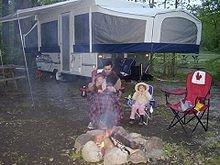
According to a national survey, more than 500 million camping trips are taken during the summer months. That’s breaks down to roughly 15 percent of the U.S. population–or a whole lot of families– looking to spend at least part of their time off from school and work bonding in nature.
The Outdoor Foundation survey also revealed that the younger a child is exposed to camping, the more likely he or she will be to embrace the idea of sleeping under the stars in a tent. Nearly half of those polled said they first went camping when they were 7 years old or younger, while only 9 percent of current campers said that they started the hobby after turning 18. In addition, more than 45 percent of the survey respondents shared that they were introduced to camping by their fathers, while only 7 percent said they were introduced to roughing it by their mothers.
And by roughing it, I’m not referring to a Motel 8 room minus Wi-Fi access and two-ply toilet paper.
More and more families, including clans headed by single moms, are turning to Mother Nature to help them reconnect with their offspring. Besides being extremely affordable, camping helps families get back to the basics by eliminating high-tech distractions and providing opportunities to live off the land.
Still, there are some risks involved when taking a family camping trip. In order to ensure your outdoor adventure is safe, consider the following:
Pack a first aid kit: Include medicine for bee stings, cuts and scrapes, plus, tweezers, bug spray, aspirin and sunscreen.
Arrive early: Setting up camp in the dark is no fun, not to mention, potentially dangerous. You should plan to arrive at your campsite with enough daylight to check over the entire site.
Inspect the site: Before pitching your tent, look for glass, rocks, bug nests, bees or other hazards. In addition, survey the site to make sure you are not set-up at the bottom of a hill which could lead to potential trouble during a rain storm. Avoid areas that could flood or become really muddy.
Build fires in a safe area: Never start fires near your tent or other fuel-burning appliances. Rather, your fire should have ample space to spread laterally or vertically. Also, when putting out a fire, douse it with water, making sure all embers, coals and sticks are thoroughly wet.
Related Articles:
Traveling With Children-Learn From My Mistakes
Flying with Children: Layover or Not?
Tips To Remember When Traveling With Children

